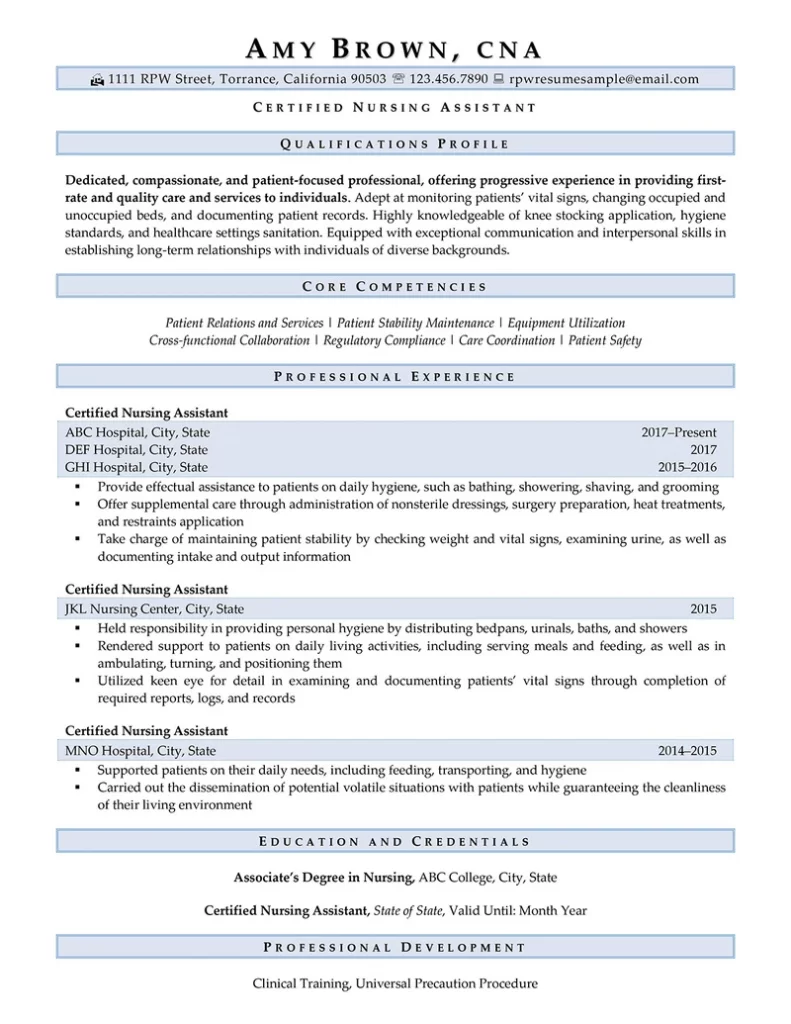According to the United States Bureau of Labor Statistics’ job outlook, the overall employment for nursing assistants and orderlies is estimated to increase by 8% from 2020 to 2030, which is as fast as the average for all jobs. Moreover, approximately 192,800 jobs for such positions—including certified nursing assistants (CNAs)—are expected to open each year over a decade. These data reveal that many of these opportunities might be a result of replacing employees who pursue another career or exit the labor force due to different reasons.
Taking that into consideration, individuals embarking on a career as a CNA must grab this opportunity. Hence, if you are one of the aspiring nursing aides aiming to land this position, start with your CNA resume first. In this article, we’ll share with you the fundamentals of the job; what you need to include on your job application tool; and the effective tips on how to create a job-winning document. Read on.
What is a Certified Nursing Assistant?
As one of the professions in the healthcare field, CNAs play an integral role in the process of providing patient care and services. They are entry-level members of a patient’s healthcare team primarily responsible for assisting patients with activities of daily living and various healthcare needs under the supervision of a registered nurse (RN) or licensed practical nurse (LPN). Working closely with nurses, physicians, and other medical professionals; CNAs deliver basic and direct patient care in hospitals, nursing homes, and long-term care facilities.
Although CNA is considered an entry-level post, it is a good starting point to pursue a career in the healthcare industry. Some aspiring healthcare providers apply their knowledge and skills as CNA to become RN or LPN, while others stay put with their current position.
What are the Duties of a Certified Nursing Assistant?
While CNAs are not required to obtain licenses and professional certifications that nurses have to perform different procedures, they can still provide healthcare services to patients. Below are some of the duties they carry out:
- Assist patients with dementia, Alzheimer’s disease, physical disability, and those undergoing post-operative recovery and convalescents;
- Help patients with bathing, oral hygiene, grooming, feeding, and elimination;
- Take and document vital signs such as temperature, blood pressure, pulse and respiration rates, and blood sugar;
- Monitor patients’ intake of oral medications as directed by physician or nurse;
- Clean rooms, change bed linens, and attend to patients’ comfort and cleanliness;
- Feed patients and record their food and liquid intake;
- Promptly respond to physical, emotional, and developmental needs of patients;
- Keep accurate records of patient care, condition, progress, and concerns;
- Plan, prepare, and serve foods based on prescribed diets; and
- Clean medical equipment use for procedures and patient care.
How Do You Become a Certified Nursing Assistant?
Like any other professions in the medical field, CNAs must equip themselves with knowledge, skills, training, and certifications before taking care of patients. Here are the four general requirements to be a certified nursing assistant.
- Obtain high school diploma or general education (GED);
- Accomplish a state-approved CNA training program;
- Participate and complete in-person clinical training;
- Take and pass a state-approved CNA certification examination
Expert Tip:
Including the abovementioned requirements in your CNA resume can boost the chances of getting your job search document in the pile of accepted applications, especially if they are outlined in the job posting.

What to Include on Your CNA Resume
To spice up your CNA resume and increase the odds of grabbing the hiring managers’ attention and passing the applicant tracking systems (ATS), make sure to include the following vital parts on your job application tool.
Updated Contact Information
At the top of your resume, write down your first and last name, complete mailing address with ZIP code, contact number, and email address. You may also include your LinkedIn URL and personal website, if you have one. Moreover, if you earned professional certifications and licenses, putting them along with your full name is highly recommended.
Specific Target Position
Also known as ‘career tag’, indicating your target job on your resume helps hiring managers and recruiters identify what position you are applying for. This also gives them an impression of you as a goal-oriented professional.
🔍 Think Your Resume’s Fine? Let’s Double-Check That
Even strong resumes can miss critical details—especially when it comes to passing Applicant Tracking Systems (ATS). Our specialists offer a free review to uncover gaps, improve formatting, and ensure your resume is ATS-ready and recruiter-friendly.
Strong Qualifications Profile / Summary of Qualifications
This portion allows you to highlight your skills, qualifications, expertise, and experience. Through resume summary, you’ll be able to showcase to the headhunters what you can bring to the table by presenting your hard skills and best feats, along with your key traits and soft skills. However, take note that they only spend an average of five to seven seconds to review an applicant’s resume. That said; it is important that your introduction has all the information indicating why you’re the best fit for the job.
In addition, make sure to use attention-grabbing resume titles and headlines instead of creating resume objective-type statement.
List of CNA Skills
As mentioned above, certified nursing assistants should possess a mix of hard and soft skills to efficiently perform their tasks. Hence, it’s crucial that you identify and choose what skills you should put on your CNA resume to effectively ace your job search. Below is a list of some of the skills you can include on your tool:
Soft Skills
- Interpersonal and communication skills
- Empathy, patience, and compassion
- Time management
- Teamwork
- Conflict resolution
- Active listening
- Calmness
Hard Skills
- Medication administration
- Knowledge of Occupational Safety and Health Administration (OSHA)
- Knowledge of medical terminologies
- Patient assessment
- Patient personal care
- Infection control
- Safety and rehabilitation
Technical Skills and Equipment
- Microsoft Office applications
- Medical administration software including MEDITECH and Epic Systems
- Telemedicine software such as Amwell and Zoom
- Blood pressure meter, thermometer, and blood-glucose meter
- Defibrillator, hemoglobin machine, autoclave, and surgical scissors
Related Article:
Detailed Work Experience
Your work history is one of the most important parts of your resume as it reveals if you really have the experience and for the job. Plus, it helps hiring managers identify if your previous roles and tasks are in line with the job post.
When listing your work experience, start with your most recent job down to your first position, regardless of their relevance to the CNA position. Include the company names and their locations, your specific job titles, and years of experience. Furthermore, under each job, state your duties, contributions, and accomplishments using bullets.
Related Article:
The Ultimate Guide to Writing a Resume with No Work Experience
Academic Background
While CNAs are not required to take associate and bachelor’s degrees, and that high school diploma or GED are the only educational requirements for this position, make sure to still include this. Indicate whether it is a diploma or general education, along with the granting institution and graduation date. Meanwhile, if you completed any college degrees, it’s also highly recommended to include them. To optimize your CNA resume, mention the awards, honors, recognition, and scholarships you have received, if there are any.
Training, Certifications, and Licenses
This area lets you showcase the state-approved CNA training program you completed, in-person clinical training you finished, and the state-approved CNA certification examination you passed. When presenting such credentials, include the state where you earned the certification as the requirements vary from state to state. Aside from these, you may also write down other trainings you participated in and certifications or licenses you obtained even if they are not related to the position.
Possible Details to Include on Your CNA Resume
Apart from the important details mentioned above, enumerating your professional affiliations, community involvement or volunteerism efforts, technical skills, and projects handled—if available—helps you take one step ahead of the competition.

How to Write Your CNA Resume
Now that you have an idea what information to include on your CNA resume, we’ll share with you some effective tips on how to write a job-winning application tool.
1. Apply a simple yet attractive design and layout.
Keep in mind that resume design and layout are also vital in your job application document. With that, make sure that your resume doesn’t contain decorative designs, too much borders, and fancy font styles. Instead, create a simple yet compelling and easy-to-read tool that highlights your best feats to boost the chances of grabbing the attention of hiring managers.
2. Select the best resume format.
The resume format that you will choose depends on your experience, qualifications, and skills. If you already have years of experience as a certified nursing assistant, the chronological format is your best choice. On the other hand, if what you can bring to the table are your transferable skills, certifications, training, and education, the functional format is your top pick.
But what if you have other non-related experience aside from CNA? You may use the targeted format that separates your relevant and non-relevant experience.
Related Article:
3. Show off your CNA skills.
Highlighting your skills and abilities as a CNA is one of the effective ways to impress employers and get their affirmative response. These include the combination of your soft, hard, and technical skills, which we’ve itemized earlier.
4. Use resume keywords and action verbs.
Resume keywords are another crucial factor that hiring managers consider when reviewing job applications, and how such keywords are used by the applicant. These help them to easily evaluate if the applicant is a perfect fit for the job. Thus, you must review the job descriptions thoroughly and make sure that you use the keywords and phrases outlined in the job posting on your CNA resume. In addition, spreading keywords on your tool also boosts the chances of beating the bots.
Meanwhile, begin your job duties and accomplishments using action verbs such as ‘take charge of’, ‘render’, ‘provide’, and ‘assist’ to make your resume more impactful and action-oriented instead of listing plain descriptions.
5. Proofread and edit your CNA resume.
Once you’re done writing your document, review it multiple times before submitting to your target company or other job portals. Doing so will help you spot and correct typos, grammar errors, and spelling and punctuation mistakes. You can also ask someone to proofread your resume and get their feedback to make sure it is ready to compete with other job hopefuls.
In need of expert feedback? Why not ask the professionals for their inputs? As a recognized resume builder, Resume Professional Writers offers free resume review to help job seekers optimize their resume.
Related Article:
Showcase Your Expertise Through Your Nurse Practitioner Resume
CNA Resume Example
To give you a better grasp of how an interviewing-generating resume looks like, containing the important details we’ve discussed and the tips we’ve shared with you, below is a sample of CNA resume prepared by one of our professional resume writers.

Note: Check out our other healthcare resume examples for more ideas.
Let the Experts Write Your CNA Resume to Ace Your Job Search
If you’re still struggling writing your own resume after reading this guide, or if you don’t have the time to do this daunting task due to your busy schedule, you can always count on the experts. Resume Professional Writers offers CNA resume writing services to help aspiring healthcare professionals land job interviews and get hired in no time. Contact us today to get started!








